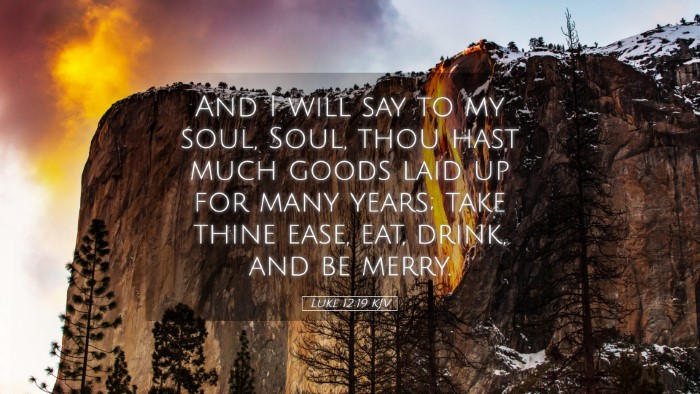Commentary on Luke 12:19
In Luke 12:19, Jesus states, "And I will say to my soul, 'Soul, you have ample goods laid up for many years; relax, eat, drink, be merry.'" This verse is part of the parable of the Rich Fool, illustrating profound spiritual truths regarding possessions, security, and the folly of self-centered living. The following insights synthesize commentary from various public domain sources.
Context of the Passage
This verse takes place within a broader discourse by Jesus focused on materialism and the attitude towards wealth. The parable serves as a cautionary tale against the dangers of accumulating wealth solely for personal indulgence without considering one’s spiritual state or the needs of others.
Analysis of Key Themes
-
Self-Sufficiency vs. Dependence on God:
The protagonist declares self-sufficiency and complacency, believing that his material riches are sufficient to ensure his future comfort. As Matthew Henry notes, this attitude reflects a serious disconnect from the reality of human vulnerability. Instead of relying on God for sustenance and security, he looks inward, placing faith in his possessions.
-
Illusion of Security:
The richness of the man serves as a façade for genuine security. Albert Barnes asserts that the accumulation of goods does not guarantee personal safety or a long life; it is merely an illusion, underscoring that one’s life is not defined by material wealth. God can demand our lives at any moment, shattering the false sense of security.
-
Folly of the Rich Fool:
Callously, the rich man ignores the transient nature of life. Adam Clarke emphasizes the foolishness of planning for years of indulgence while neglecting the spiritual aspect of existence. His perspective is limited and ultimately leads to his downfall. The rich fool’s planning is devoid of God’s providence and neglects the divine purpose for his life.
-
Divine Judgment and Accountability:
The narrative transitions to reveal the consequences of the rich man’s choices. Immediate divine judgment is given in response to his assumptions of control over his wealth and future. The words "this night your soul is required of you" remind readers of the urgency of spiritual preparedness. Nobody can predict their time of departure from this world, making the call to act responsibly with one’s possessions an imperative for meaningful living.
Spiritual Lessons for Believers
The parable presents several crucial lessons for contemporary believers, particularly within a wealthy society where similar attitudes can prevail.
-
Evaluate Your Priorities:
Believers are urged to conduct a self-examination regarding their values and priorities. Are they living for a greater purpose, or are they ensnared by the allure of wealth? Matthew Henry encourages reflecting on one's relationship with both God and material wealth, prompting an assessment of where true treasure lies.
-
Understand Temporal Nature of Life:
The brevity and fragility of life is a primary theme. Believers are reminded that their time on earth is limited, thus they must invest wisely in eternal matters. Albert Barnes indicates that focusing on spiritual wealth, rather than hoarding earthly possessions, should be the priority of true disciples of Christ.
-
Live Generously:
The rich fool’s ultimate failure was his orientation towards selfishness and individualism. Instead, believers should embrace a lifestyle of generosity, mirroring Christ’s teachings. Adam Clarke asserts that a proper understanding of wealth leads to a generous spirit, sharing resources with the needy as a reflection of God’s grace.
-
Seek Eternal Wealth:
In contrast to the rich fool, believers are called to seek the kingdom of God and his righteousness, which brings lasting fulfillment. Matthew Henry insists that when one prioritizes divine matters over earthly ones, they will find heavenly treasures that surpass worldly wealth.
Conclusion
Luke 12:19 serves as an introspective reminder for Christians regarding the value of their lives in relation to earthly possessions. Reflecting on the rich fool's choices illustrates the folly of placing security in wealth rather than God. It challenges readers to embrace a lifestyle that prioritizes spiritual enrichment over material gain, demonstrating a commitment to a life that acknowledges the transient nature of earthly existence. Pastors, students, and theologians alike can draw profound insights from this parable, urging them onward in their pursuit of a life reflective of God’s glory rather than self-serving pursuits.


